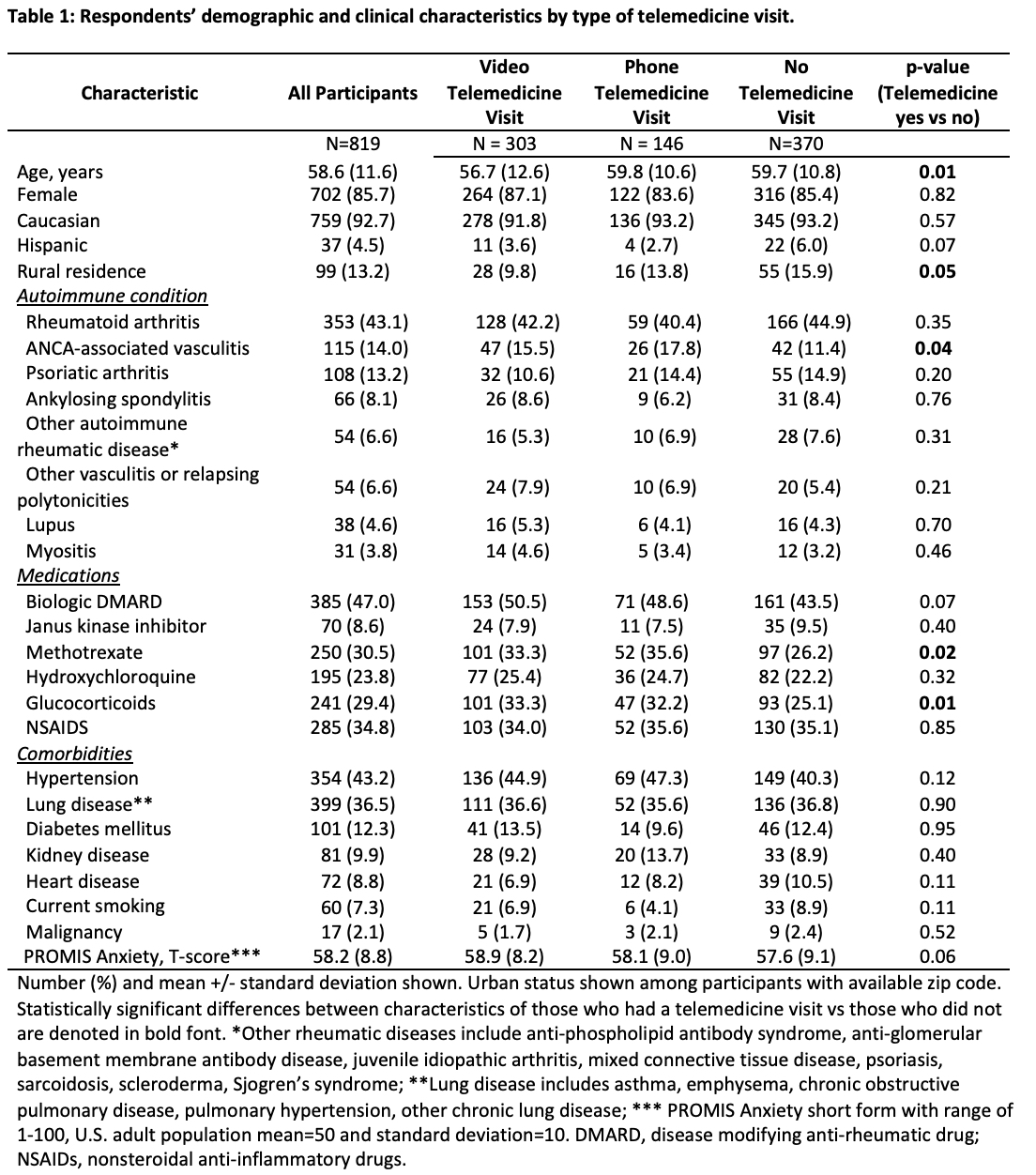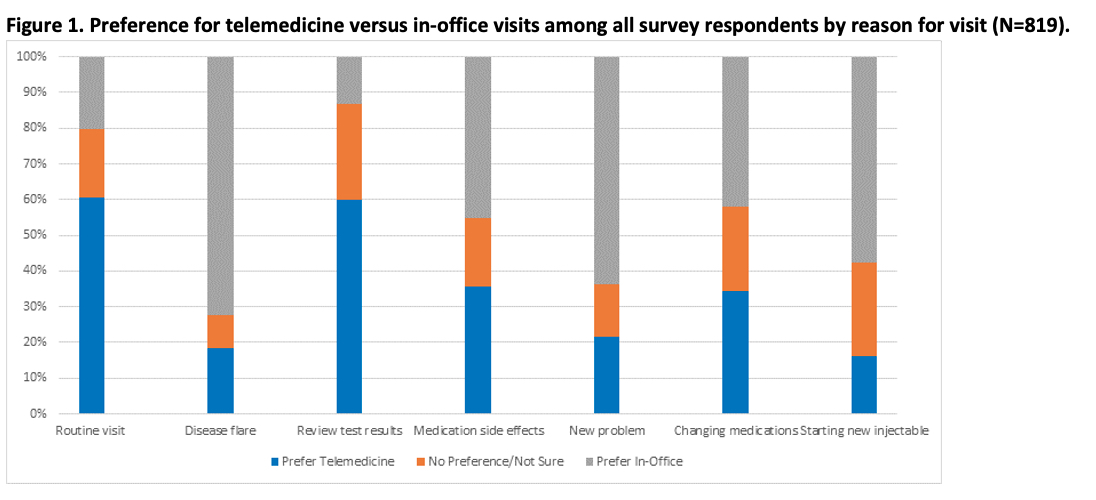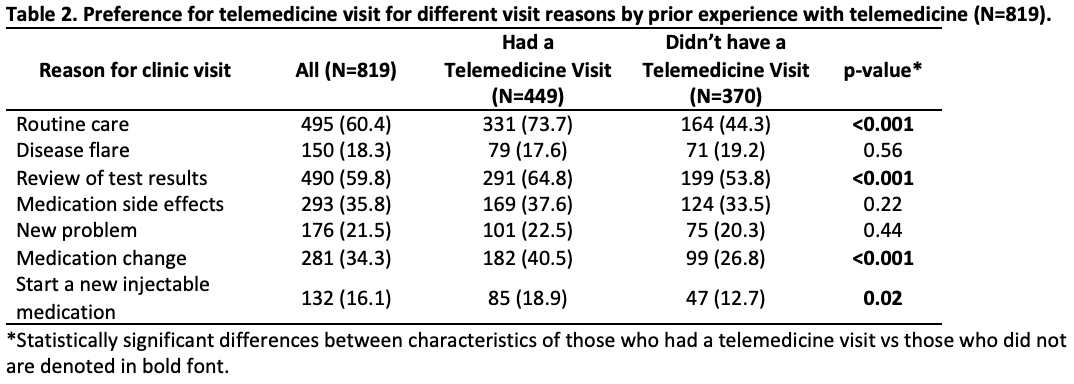Session Information
Date: Tuesday, November 9, 2021
Title: Patient Outcomes, Preferences, & Attitudes Poster IV: COVID-19 (1589–1613)
Session Type: Poster Session D
Session Time: 8:30AM-10:30AM
Background/Purpose: The COVID-19 pandemic disrupted the delivery of medical care and resulted in a substantial uptake in telemedicine care for patients with chronic conditions, including autoimmune rheumatic diseases. The objective of this study was to assess perceptions and preferences about telemedicine among patients with autoimmune rheumatic diseases during the COVID-19 pandemic.
Methods: We conducted an online survey among members of ArthritisPower and Vasculitis Patient Powered Research Network online patient registries and members of the following patient organizations: Myositis Support and Understanding, Lupus and Allied Disease Association, American Bone Health, and International Foundation for Autoimmune & Autoinflammatory Arthritis. Attitudes about telemedicine (i.e., telemedicine acceptability) were evaluated using the validated telemedicine perception questionnaire (TMPQ). The TMPQ score (range 17 to 85) was calculated; higher scores show higher acceptability. Visit satisfaction was measured using the one question scale from the validated Agency for Healthcare Research and Quality Consumer Assessment of Healthcare Providers and Systems (CAHPS)® survey (0-10 scale, 0 represents worst possible visit, 10 represents best possible visit). T-tests and multivariable linear regression compared the satisfaction and TMPQ scores between respondents who reported participating in video and phone-only visits. Chi-square tests compared preferences for telemedicine visits for specific clinical scenarios between those who had telemedicine visit versus those who had not.
Results: Between June 18 and August 10, 2020, we received 819 responses. Participants had a mean (SD) age of 58.6 (11.6) years and were mostly white (n= 759, 92.7%) and female (n=702, 85.7%). Of 618 participants who said that telemedicine was available to them, 449 (72.7%) reported having a telemedicine visit, with 303 (67.5%) reporting at least one telemedicine video visit; the remainder had a phone-only visit (Table 1). On a 0-10 scale, the mean (standard deviation) visit satisfaction score for telemedicine visits was 7.3 (1.8) with 25.8% being very satisfied (score 9 or 10). The mean (SD) telemedicine acceptability as assessed by TMPQ score was 62.8 (10.7). Video visits and higher TMPQ score were associated with higher satisfaction (data not shown). Preference for a telemedicine visit varied substantially by reasons for the visit (Figure 1). Compared to those who had not yet had a telemedicine visit, patients who had experienced telemedicine were more likely to prefer telemedicine for routine visits (73.7% vs 44.3%, p< 0.001), reviewing test results (64.8% vs 53.8%, p< 0.001), when considering changing medications (40.5% vs. 26.8%; p< 0.001), and when starting a new injectable medication (18.9% vs. 12.7%; p=0.02) (Table 2).
Conclusion: During the COVID-19 pandemic, patients with autoimmune rheumatic diseases frequently had telemedicine visits, the majority via video, and were often satisfied with these visits. These results suggest that because such patients prefer telemedicine for certain types of visits, maximizing effective use of telemedicine should take into consideration specific clinical scenarios and patient preferences.
To cite this abstract in AMA style:
Danila M, Gavigan K, Rivera E, Nowell W, George M, Curtis J, Christopher-Stine L, Banerjee S, Merkel P, Young K, Shaw D, Gordon J, Venkatachalam S. Telemedicine for Rheumatology Care During the COVID-19 Pandemic: Patient Perceptions and Preferences [abstract]. Arthritis Rheumatol. 2021; 73 (suppl 9). https://acrabstracts.org/abstract/telemedicine-for-rheumatology-care-during-the-covid-19-pandemic-patient-perceptions-and-preferences/. Accessed .« Back to ACR Convergence 2021
ACR Meeting Abstracts - https://acrabstracts.org/abstract/telemedicine-for-rheumatology-care-during-the-covid-19-pandemic-patient-perceptions-and-preferences/



